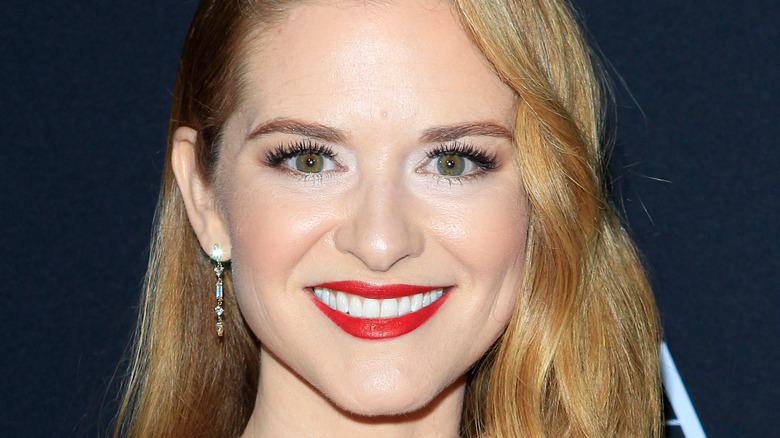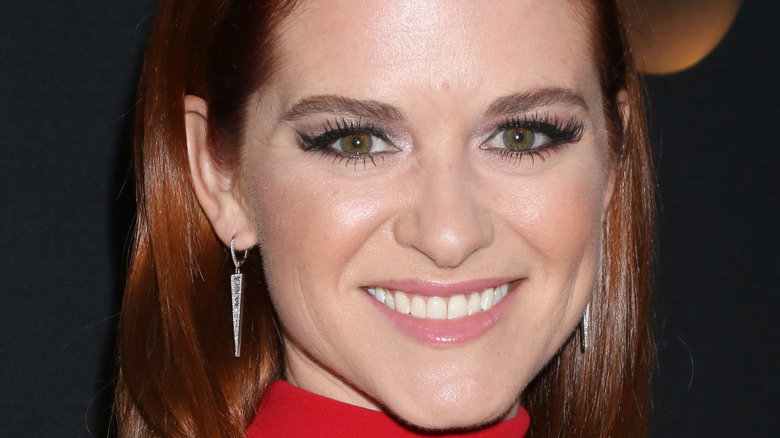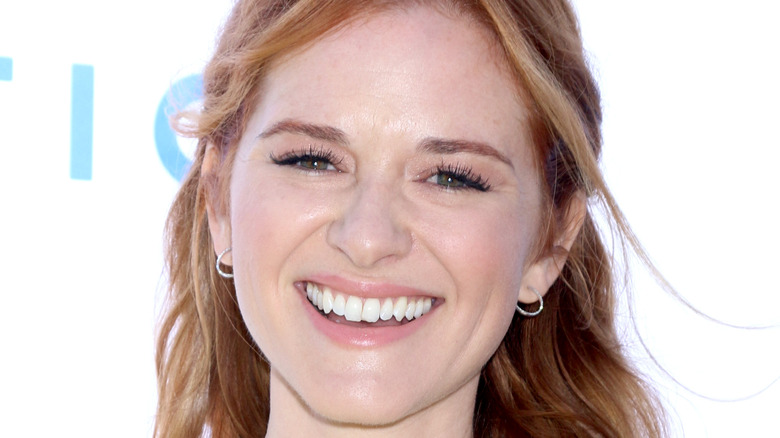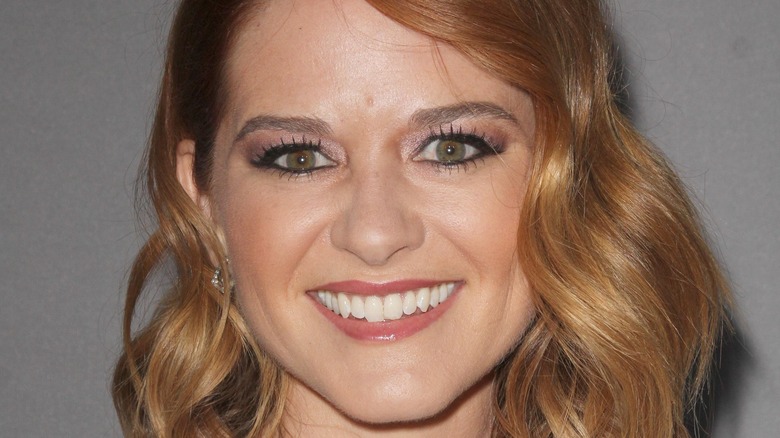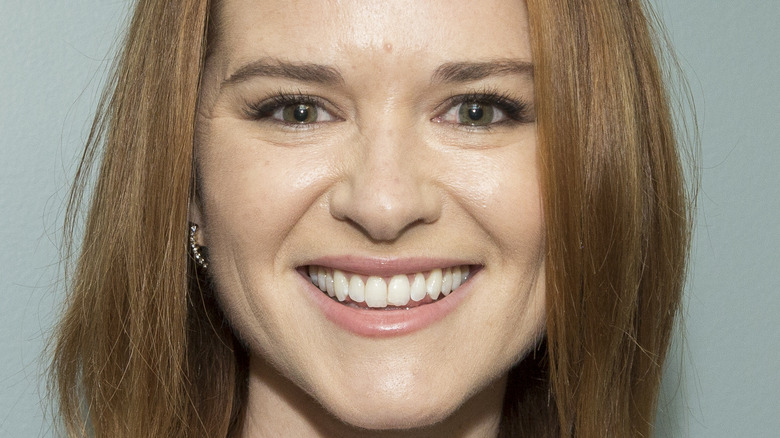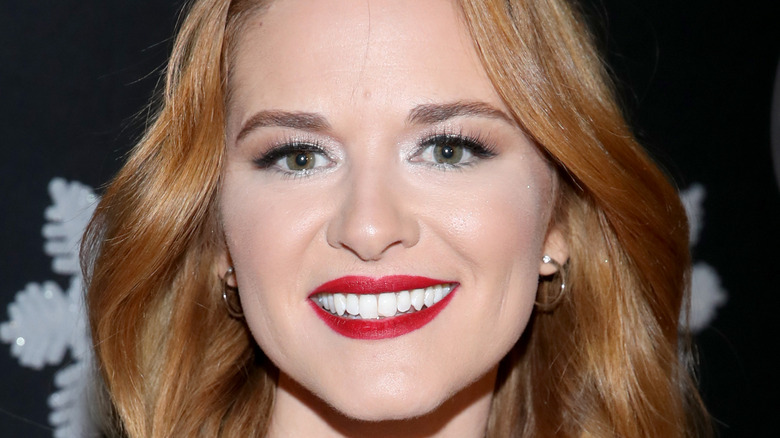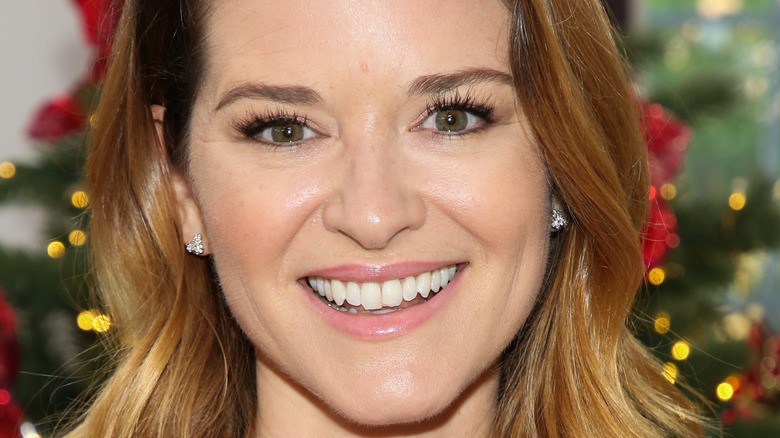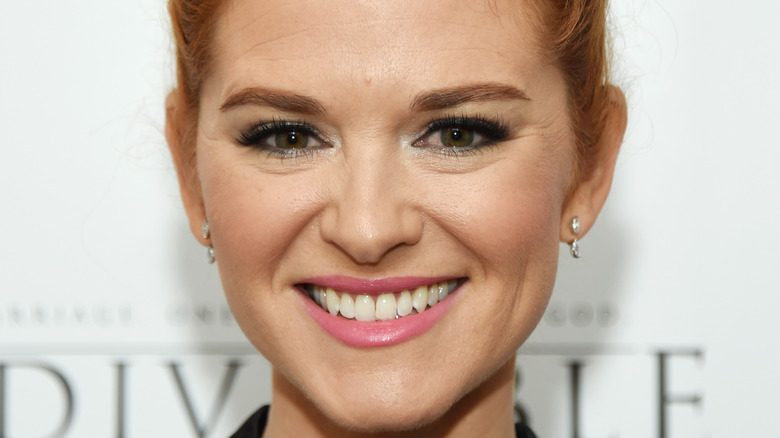Sara Drew On Lifetime's Stolen By Their Father And Grey's Anatomy Memories - Exclusive Interview
Actress Sarah Drew has had a successful career in Hollywood for over two decades. Over the years, she's appeared in several popular television shows, including "Everwood," "Mad Men," "Glee," and "Supernatural." Her career skyrocketed to new heights when she was cast as Dr. April Kepner on "Grey's Anatomy" in 2009. The actress appeared as a series regular until 2018, when Dr. Kepner was written off the series following a complicated storyline, according to People. Drew did return to "Grey's Anatomy" for one episode in 2021, much to the delight of fans.
Following Drew's time at Seattle Grace Hospital, she starred in several Lifetime movies, including "Twinkle All The Way" and "Christmas Pen Pals," to name a select few (via TV Line). Drew's latest Lifetime project is a Ripped from The Headlines film titled "Stolen By Their Father." The story is based on the autobiographical memoir "Piece of Me: Rescuing My Kidnapped Daughters" by Lizbeth Meredith.
Drew stars as Lizbeth Meredith, and the movie shows viewers the struggles and fear Meredith faced in the quest to rescue her two young daughters, who had been kidnapped by their father, her abusive ex-husband.
Speaking exclusively with The List, Sarah Drew discussed the emotional process of filming "Stolen By Their Father" and the important lessons she learned throughout. The actress also reflected on her time on "Grey's Anatomy" and revealed how Sandra Oh ultimately impacted her career.
If you or someone you know is dealing with domestic abuse, you can call the National Domestic Violence Hotline at 1−800−799−7233. You can also find more information, resources, and support at their website.
She discussed the difficult subject matter of Stolen By Their Father
"Stolen by Their Father" is based on an autobiographical memoir, and you're portraying Lizbeth Meredith in the film, so I was curious if your preparation process for this type of movie is different than it would be if you were playing a fictional character?
It's interesting because I've played real, true to life characters a few times, but all of the characters that I've played are not people that have distinctive walks and talks and that are not recognizable to the general public. It's not like I'm trying to play Lucille Ball or somebody like that. Whenever I approach a role like that, I like to really investigate and dig into what's on the page, because oftentimes, someone's life story is expanded, or it has things that wind up distracting from what the story is that we're actually telling.
I really did look at what was going on in the story, and I read up a little bit about Lizbeth and about her story, and I was completely blown away by her courage and determination in the face of so many obstacles to get her girls back. That's how I prepared. It's very similar to preparing for any other kind of role for me, except that you feel the gravity of, "I'm telling a true story and a story that actually affects a lot of people." There are a lot of people, and I didn't realize this, that find themselves in this situation. This happens more often than we would like to think.
It's such a difficult subject matter, but then, like you said, to also learn through that process that it really affects so many people, I'm sure that this will hit home for a lot of viewers that can recognize themselves in her journey, and the horrible amount of obstacles that she had to go through to get her kids back. You would think it would be something so simple, and it's not.
It's so many roadblocks in her way, the biggest one being that once you cross into another country, they don't have to follow any of the rules that are set in place by your home country. Even though she has full custody, when she goes to Greece, they can decide whether they want to honor that custody agreement or not. She winds up having to fight in the Greek system to get approval that she is allowed to have her girls back.
This is a woman who's a survivor of abuse, of emotional and physical abuse. Her husband abused her for their entire relationship, and that's why she got out of it. Here she is trying to desperately plead with this other government to let her have her children back when it seems that they are now also in danger in the same way that she was. It's heart wrenching.
Drew shared details about the filming process
You wouldn't think that when you go to a different country, that they would just be able to say, "All right, clean slate for us, we can decide what's going on." I'm sure, also, that the process of filming all of those difficult scenes back-to-back must have been emotionally taxing for you as you're constantly in this heightened state of emotion. What did you do to separate yourself from your character afterwards?
I know, it's hard ... We went to Greece [to film], and we shot the first half of the movie in Greece, and I was actually able to bring my family with me.
In playing all of these incredibly emotional, taxing scenes, I was still able to go home to my children and my husband. We stayed on Greek time, so with the kids, we'd have dinner at 9:30 at night, and everybody went to bed at 11. We had dinner together every night when I was out there, and so, I think everything snaps back into reality as soon as kids are involved. I can feel exhausted and my husband will bear the repercussions of that. [Laughs]. When I have two children who need me and are super happy and excited to see me after a day of exploring, it's like, "Oh, I love you! Yay! Let's eat some food!"
That was great. The Canadian trek — because we did half of it in Greece and then I did the second half in Canada without my family — the last day I was like, "Get me home to my children," because it was so intense. She is in a heightened state of panic and anguish in most of the movie ... There are a couple little places to relax, but it is very up there and very intense through the whole thing, which makes it a thrilling ride to watch, but an exhausting one to film.
I'm sure, as a mother, it must be so complicated to deal with that and confront that reality that other people are facing. I'm sure when you were done, you were like, "I want to be with my kids," and enjoy them and their presence.
And feel grateful that I'm not in that set of circumstances. We had a really emotional courtroom scene where, after we rehearsed it, there was a woman who was one of our background artists who said, "This is triggering for me, because I sat in that exact seat." Her story wound up very differently, and so she had a very big emotional reaction to it. That grounded the whole cast and crew in this, the weight of the reality of this excruciating scenario that happens to so many more people than we would like to think it does.
She also talked about channeling the authenticity of parenthood in her new role
It's one thing to read about it, but then when you're actually immersed in it and you're hearing this person's story and you're realizing that not everybody gets the happy ending that they deserve, it must be such a moment of reflection and just kind of learning through this process of playing this role. That seems difficult to manage all of those emotions and then also have to be ready to go and film and roll through everything.
I know. On my last two days in Canada, we shot all the stuff in my house, in Lizbeth's house, all kind of in two days. When I'm in my house, I have multiple little short scenes of different levels of trauma, like horrible phone calls and devastating realities, and pleading to a cop, and hearing a threat from her husband that he's going to kill her after she returns home empty-handed. It was so intense. Like, oh my gosh. I think my last day I had nine of these little short scenes one right after another, but all in different parts of the journey. [There are] some places where she's able to let it out a little bit, other places where she's just holding it back. It was intense.
Oh my gosh. How do you get back into that headspace when you're filming between those? You're going to take a break, so how do you ramp up those emotions again to be so on when the camera's rolling?
Honestly, since I've had children in my life — my son just turned ten, I've been a mom for ten years — there is a well of emotional access that has opened up in my body, and if we're doing anything regarding children or being separated from children, I'm there. It's not difficult to access the trauma and the fear and all of that stuff, because it exists in my body. I'm always in varying degrees of joy and fear with my kids.
That's what being a parent is about, so you're channeling that authenticity.
"This is delightful. This is so fun. And also, I'm really terrified you might choke to death." [Both laugh].
Like, "I'm really happy we're all in Greece together, but could you also just maybe not run so fast?"
Don't go to the edge of that giant rock! No offense. [Laughs].
You're like, "I would prefer if you didn't grievously injure yourself while I'm trying to do this."
Yes, exactly!
Drew reminisced about her time on Grey's Anatomy
I did actually want to briefly mention your "Grey's Anatomy" career as well because you spent such a long time on the show. I was wondering, how do you feel that time in particular in your career helped you grow as an actor?
In so many ways. One of the biggest ways that it helped me grow was that it was such a collaborative environment where I was invited to give input into the development of my character. It was the first time I'd ever really felt like I had a voice as an actor. I wasn't a producer, I wasn't a writer, but I was given a voice to speak to the journey of my character. That gave me a lot of confidence and courage and allowed me to see that I have a lot of good ideas and that I was a real asset to that process.
Since then, I've directed, I've produced, I'm now in prep for a film that I wrote, that I'm producing and starring in, that starts in a few weeks. It's all of those little steps along the way to build that confidence, to be able to go, "You know what I think of this?" I've had enough conversations with writers in the process of figuring out where this character is going, so that was really cool.
That's amazing that it gave you the skills and the confidence you needed to expand your career in all these other directions, that I'm sure you were interested in already, but to have that reassurance of knowing that you can collaborate to such an extent is probably just amazing.
It was also wonderful because I had incredible people I was watching do that, like Sandra Oh. Gosh, she's so amazing. It's not just that she's a phenomenal artist and actor, but she's so smart. She's so prepared, such a pro, always so positive on set, but also a huge collaborator. I spent my first couple years on the show watching her interact with the writers and the producers and I went, "Oh, am I allowed to do that too? Maybe someday I'll be allowed to do that too." It felt like they had this beautiful back and forth relationship where they were all figuring it all out together. I had wonderful examples of that as well.
She's such a force and she's so incredible, and it's nice to know that she leads by example as well.
Every set is better when she's on it.
She learned the importance of collaboration
How fortunate that you were able to really get that experience and feel that it was a positive one as well. I think that's always something that makes a huge difference.
Yeah, because you could've just as easily been on a set where an actor has an idea and they're completely shut down and told to sit down and do your job and stop interfering. That wasn't the case on "Grey's," we always had a voice. I developed so many beautiful relationships with the writers over there because I was constantly getting in there and being like, "Oh my gosh, I love this. What if we also did? Or what about this?" It was really beautiful, really collaborative.
I'm sure they understand as well that you were the one living in the character's skin and you're connected to the character on a level that maybe they can't quite get just from writing, so it helps to have your insight and perspective and to be able to say, like, "I don't think that's something she would do," or "maybe that's something she would do at a later juncture" and piece that together.
That was always the reaction I got from the writers. They're like, "I'm so grateful that you care so much, that you really care about how we tell this story and that we tell it as authentically as possible, and your investment in it means everything to us." I like to carry that with me everywhere I go. I'm very collaborative on every set, whether I'm a director, or producing, or starring, or a more supporting role. Every place I go, I bring that with me.
Like you were saying, with this new project that you have coming up where you're wearing so many hats, I'm sure it helps to know that you can facilitate that environment yourself and get everybody involved in it.
I'm a big proponent of "the best idea wins." Throw the ego out the window, let's figure out what's best and let's go with that.
I think that it's always tough, especially in acting, or in journalism as well, to remove the ego from things. But I always think that I care so little about my own ego, I would prefer to just do the best thing or the right thing.
I want it to be good!
Drew shared the most rewarding aspects of filming Stolen By Their Father
If your name's on it, you want it to be something that you are proud to have your name on! That's a huge deal.
Even on this project, "Stolen By Their Father," I spent two four-hour Zoom sessions with my director, going through every page of the script and diving in and figuring out what we could shift here or there, or how we could bring this up more here. It was a really fun process. Simone [Marie Stock] was incredible in that process.
What did you find most rewarding about filming "Stolen by Their Father"?
There were a lot of rewarding things about it. One of the things on the top of my list is being able to bring my family to Greece and being able to be in Greece and see that gorgeous country and interact with people and eat the food and drink the wine. We had an absolutely extraordinary time. That was a surprise to all of us, because it all happened very quickly. I was offered this movie a couple weeks before I had to leave, and we were taking the kids out of school and we were like, "They're coming, because we're not going to get another opportunity like this!" That was an extraordinarily rewarding piece of the process.
The other really rewarding thing was getting to see [an earlier cut] a couple weeks ago ... It was a very rewarding experience to watch it, because I found that as thrilling as the movie is, and it's one of those Ripped from the Headlines thrillers, you are on the edge of your seat. You are in the fight with Lizbeth the whole way through ... The heartbeat of the whole movie is love, and it's in every frame. It's not revenge. It's not rage. It's not anger. It is everything. It's a pure motivation of love.
it's a love of children, a mother's love for her children. It's a father's love for his daughter, because we go back in time and see Lizbeth's past where her mother actually kidnapped her away from her father as a child. She's being reminded of that experience. It's the love of a friend. She [Lizbeth] has so many friends, and her community comes up and rallies behind her to help her in this fight, and most of them are women too, so it's really about these women becoming these powerhouses for one another in order to unify this family that's been torn apart, and it's very powerful. That was very rewarding to see it all put together, and hearing the music and watching how it was all put together to create a really compelling story. I was pretty psyched.
She highlighted the importance of relying on your community
It sounds like it was just an incredible experience, and it's nice that you feel empowered by this, and that you feel like it can then go on and empower the women that are viewing it. I think that's very needed, and always very welcomed in the world.
Yes. Lizbeth's a hero and she is a survivor and there's no ... It's not about victimhood. Sometimes, thrillers can be about women being abused, and the reality is that she did live a life being abused by her ex, but she turned it on its head. She survived, and then Lizbeth went out to work in a women's shelter for survivors of domestic violence. That's what she's doing with her life. She's advocating for people in the same situation she was in. You feel that energy thrumming through her in every frame of the movie. She is a survivor. She will survive. She will stop at nothing, and no one can shake her. It's powerful. It's empowering.
That's a powerful message to give to people who maybe are suffering with those things silently and realize that there's another way forward to get through these difficult things.
Yeah. You need people to surround yourself with. That's the other thing, it's not just about this one woman who grabs herself by her own bootstraps and figures it all out. She leans on her community to help her in this battle. And for me, that community is oxygen. I believe that there is no movement forward or fullness of life without community, in my opinion. That is how I live my life and this movie really, even though it's really about Lizbeth, she is locked in, invested in a community that loves her, and you see that she needs them. She needs them to accomplish what she sets out to do. It's beautiful.
"Stolen By Their Father" premieres March 5th on Lifetime.
